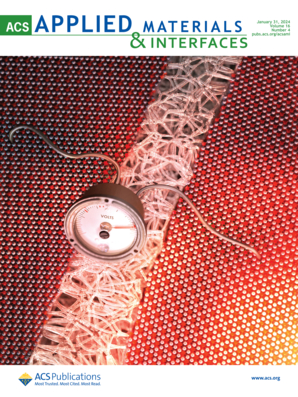通过辐照合成的固溶体 HxPO4@Fe3O4 提高了对废水中钨(VI)的吸附能力和对共存氧阴离子的抗干扰能力:表面氧化作用
IF 8.3
2区 材料科学
Q1 MATERIALS SCIENCE, MULTIDISCIPLINARY
引用次数: 0
摘要
钨(W)在自然界中主要以六价氧化态存在,被认为是一种日益突出的水性污染物,同时也是一种重要的金属。因此,开发一种从含 W(VI)废水中吸附 W(VI)的材料,以实现 W(VI)的高效富集和回收具有重要意义。受磷酸盐和 W(VI)离子在酸性溶液中自组装形成磷钨多氧阴离子(如 Keggin 型 PW12O403-)的启发,在这项工作中,我们通过 β 粒子辐照将磷酸盐离子负载到磁性 Fe3O4 纳米粒子(Fe3O4 NPs)表面,合成了一种复合吸附剂 HxPO4@Fe3O4 固溶体(SS)。这种新型吸附剂对 W(VI)的吸附和回收非常有效。批量吸附实验结果表明,HxPO4@Fe3O4 固溶体在水环境中对 W(VI)具有很高的吸附效率,并且具有很强的抗共存离子(尤其是 PO43-)干扰的能力。在室温条件下(∼25 °C),最大吸附容量达到 88.44 mg g-1。这种方法不仅确保了 W(VI)吸附量的大幅提高,还为吸附剂的回收提供了便捷的途径,同时最大限度地减少了额外的环境负担。根据傅立叶变换红外光谱、Zeta 电位和 X 射线光电子能谱的表征结果,我们推测吸附过程的可能机理是酸性溶液中形成的 W(VI) 聚氧阴离子最初被静电吸引到带正电荷的 HxPO4@Fe3O4 表面、然后聚氧阴离子的 W-OH 与 HxPO4@Fe3O4 表面的磷酸羟基 (P-OH) 发生氧化反应,形成 P-O-W 桥接氧基。这种吸附机理也反映在吸附动力学和吸附热力学中,前者遵循伪二阶动力学模型,后者表现出较大的焓变(-76.3 kJ/mol)和显著的熵降(-174.5 J/(mol K))。本文章由计算机程序翻译,如有差异,请以英文原文为准。
The solid-solution HxPO4@Fe3O4 synthesized by irradiation enhances the adsorption capacity of tungsten(VI) and anti-interference of coexisting oxoanion in waste water: Surface oxolation interaction
Tungsten (W), mainly existing as hexavalent oxidation state in nature, has been considered as an increasingly prominent waterborne pollutant, but it is also a critical metal. Therefore, it is important to develop a material to adsorb W(VI) from the waste water containing W(VI) to realize the high-efficiency enrichment and recovery of W(VI). Inspired by self-assembly of phosphate and W(VI) ions in the acidic solutions to form phosphotungstic polyoxoanions (e.g., Keggin-type PW12O403−), in this work, we have loaded the phosphate ion to surface of the magnetic Fe3O4 nanoparticles (Fe3O4 NPs) by β particle irradiation to synthesize a composite adsorbent, HxPO4@Fe3O4 solid-solution (SS). This novel adsorbent is very efficient for W(VI) adsorption and recovery. The results of a batch of adsorption experiments indicate that HxPO4@Fe3O4 SS has a high adsorption efficiency for W(VI) in aqueous environments and strong anti-interference of coexist ions especially PO43−. Under room temperature conditions (∼25 °C), the maximum adsorption capacity reaches 88.44 mg g−1. This method not only ensures a substantial increase in W(VI) adsorption but also provides a facile means for adsorbent recovery, while minimizing additional environmental burdens. Based on the characterization results from Fourier transform infrared, Zeta potential, and X-ray photoelectron spectroscopies, we speculated that the possible mechanism of the adsorption process is that formed W(VI) polyoxoanions in acidic solutions are initially attracted by electrostatic attraction to the positively charged HxPO4@Fe3O4 surface, and then oxolation reaction occurs between W-OH of polyoxoanions and phosphate hydroxyl (P-OH) on the HxPO4@Fe3O4 surface to form P-O-W bridging oxygen group. This adsorption mechanism is also reflected in the adsorption kinetics, following a pseudo-second-order kinetic model, and adsorption thermodynamics, exhibiting a large enthalpy change (−76.3 kJ/mol) and a significant entropy reduction (−174.5 J/(mol K)).
求助全文
通过发布文献求助,成功后即可免费获取论文全文。
去求助
来源期刊

ACS Applied Materials & Interfaces
工程技术-材料科学:综合
CiteScore
16.00
自引率
6.30%
发文量
4978
审稿时长
1.8 months
期刊介绍:
ACS Applied Materials & Interfaces is a leading interdisciplinary journal that brings together chemists, engineers, physicists, and biologists to explore the development and utilization of newly-discovered materials and interfacial processes for specific applications. Our journal has experienced remarkable growth since its establishment in 2009, both in terms of the number of articles published and the impact of the research showcased. We are proud to foster a truly global community, with the majority of published articles originating from outside the United States, reflecting the rapid growth of applied research worldwide.
 求助内容:
求助内容: 应助结果提醒方式:
应助结果提醒方式:


